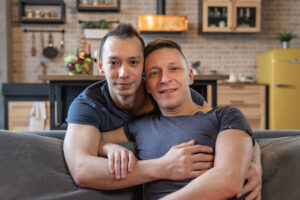Husband or boyfriend doesn’t want to have sex?
Managing differences is one of the most challenging aspects of a romantic relationship. We struggle in relationships to understand and accept “otherness” in those we choose to love. To cross over from our own indignation, reach out to our partners, listen deeply, validate, and negotiate difference forces us into uncomfortable places. This is even more true when our perceived differences revolve around our sex life.
All couples will likely struggle with desire discrepancy (or mismatched libido) at some point in their relationships. We are still highly emotional beings whose sexualities are altered by stress, current events, grief, disinterest, etc. We will inevitably encounter periods where the weight of living is too burdensome to engage in sex. For others, this weight may intensify our desire. Conflict often occurs when one partner is aroused and the other is not. This dilemma is known as hypoactive sexual desire disorder (HSDD).
For gay couples, this “problem” can cause great anguish. A 2019 study showed a direct correlation between perceived sexual desire discrepancy and relationship satisfaction. Sexuality is often at the core of the connection between gay folks. The stress experienced due to high or low sexual desires touches critical vulnerabilities: gender, social expectations, shame, and fear of rejection and abandonment.
For instance, sex therapists Barry and Emily McCarthy argue that cultural expectations of men to experience sexual desire spontaneously and to always be interested in sex underplays eroticism and leads to sexual dissatisfaction. This can make addressing and understanding desire discrepancy challenging in gay male relationships. Rejection (in either direction) often meets gay men with the parts of themselves that internalize the notion that we are only lovable when we are wanted. The rejection gay men feel when one partner is “in the mood” and the other isn’t can directly hit us where it hurts.
So, what happens next? We might tell ourselves that our partner “isn’t the one.” We may resent our partner with a higher or lower desire for neglecting our needs. We may even withdraw or break up or divorce.
Sexuality is just one domain in relationships where we negotiate “otherness.” Still, for gay men, the intensity at which we can emphasize sexual satisfaction can fan the flames of relationship woes.
Cultural expectations of gay men to be strong, masculine, and hypersexual (often reinforced within gay culture) leaves many men feeling more isolated, shameful, and guilty of their basic human needs for connection and love.
What to do if your husband or boyfriend doesn’t want to be intimate? If you are struggling with desire discrepancy in your relationship, talk to your husband or boyfriend about your underlying anxiety feelings. Rather than jumping to “we’re not compatible,” first discuss what sex means to both of you, and identify any vulnerabilities that come up when both of you experience perceived or actual rejection from each other.
Working with a couples therapist (and one trained in sex therapy, in particular) can help you initiate these difficult conversations, and help both of you understand yourselves more so that you’re more likely to connect with each other authentically.
When partners align as sexual teammates, they can construct solutions that work for both of them. Barry and Emily McCarthy stress that when partners take responsibility for their own desire, serve as an intimate sexual team, and reject the shame, guilt, and blame that subverts the change process, sexual desire can thrive.
As a couple, you can deepen your sexual connection and manage desire discrepancy with greater ease. Either through your own attempts or with the help of an experienced therapist, take the first step toward conversations that are rooted in vulnerability and the willingness to connect.









